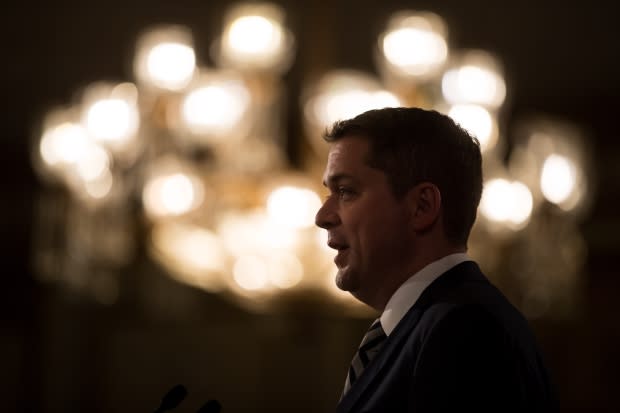Scheer steps back from his deficit promise — and denies Trudeau a weapon
It's far too soon to measure the full extent of Justin Trudeau's political legacy, but he has now managed at least one truly remarkable achievement: he has persuaded the Conservative Party to admit that balancing the federal budget, even outside of a recession, is not absolutely necessary.
Trudeau might wish he hadn't been so successful.
In a speech to the Canadian Club of Vancouver on Friday, Conservative Leader Andrew Scheer said a government led by him would seek to "phase out" the current deficit in the "medium term" — five years, to be specific.
That new timeline is a significant departure from what Scheer promised when he was seeking the leadership of the party two years ago.
At that time, Scheer claimed that he would not be deterred by the skeptics.
"A lot of people think that a two-year target for a balanced budget is too aggressive. That it can't be done. I reject that," he said in a video posted to Twitter on March 27, 2017.
"I think it's very important to have an ambitious timeline to return this country back to balanced budgets. Because every year that we're in deficit, we're borrowing money from my children and spending it today."
The moral imperative
This was the moral imperative that the Conservatives attached to the deficit, to explain why it needed to be balanced without delay.
"If Justin Trudeau can rack up $30 billion deficits in just one year," Scheer concluded, "surely Conservatives can return Canada back to balanced budgets in two years."
Surely! But also, maybe our children will forgive us for waiting another three years.
Scheer's current argument is that it would be irresponsible to balance the budget too quickly.
This new position rests on the suggestion that the federal government's fiscal situation has somehow deteriorated over the last two years. But the official balance sheet actually hasn't changed much. If anything, the federal situation has improved.
Five days before Scheer posted that video to Twitter, Finance Minister Bill Morneau tabled his third budget, with projections that cast forward as far as 2022. At that time, Morneau projected deficits of $23.4 billion, $21.7 billion and $18.8 billion for the fiscal years 2019-2020, 2020-2021 and 2021-2022.
In the most recent budget, tabled two months ago, Morneau projected deficits for those years of $19.8 billion, $19.7 billion and $14.8 billion. In 2022-2023, the deficit is expected to decline to $12.1 billion. The next year (what would be the fourth year of a Scheer government), the deficit is projected to be $9.8 billion.
The more significant differences between 2017 and 2019 would seem to be political. For one thing, Doug Ford is premier of Ontario. For another, Scheer is preparing to campaign in a general election.
The Ford effect
The Ford government tabled its first budget in April and it has spent every week since trying to justify and explain its cuts to provincial services and programs. Ford campaigned on a promise that balancing the provincial budget would be easy and relatively painless. That turned out not to be the case. And now the pain is being felt by Ford's Progressive Conservatives, whose public support has plummeted.
Trudeau's Liberals were already associating Ford's actual austerity with Scheer's plans for the same, eagerly projecting what a two-year return to balance would look like. Scheer seems to have taken stock of all that and decided that sticking to his original timetable wasn't worth the trouble.

Sidestepping the deficits the Harper government ran between 2008 and 2015, Scheer's Conservatives have spent much of the last four years lamenting the fact that the federal budget is not balanced. That was in keeping with both the theoretical tenets of conservatism and the political orthodoxy that has existed since the mid-1990s, which held that a balanced budget was the hallmark of a properly managed federal government.
Even if the parliamentary budget officer consistently found that federal finances were "sustainable" — and some economists shrugged at the numbers involved — the complaint persisted, in part because Trudeau himself had promised that the budget would be returned to balance by 2019.
The Conservatives have lambasted Trudeau for backtracking on that commitment. But now Scheer has abandoned his own promise.
The Liberals lose a talking point
Deficit hawks might decry the concession. But it's the Liberals who might be most disappointed. They were surely looking forward to running against a promise of more dramatic cuts.
The prime minister might find some solace in the fact that he seems to have succeeded in moving the conversation. In the fall of 2015, when he acknowledged that the Liberals would run a deficit, it was considered a bold and potentially ruinous admission. Nearly four years later, his Conservative opponent is having a hard time promising to balance the budget.
Even so, the debate is not entirely over. Absolutely projecting a balanced budget in five years will require some kind of projected cut. Scheer has already promised two tax breaks — removing the GST on home heating costs and making parental benefits tax free — and the Conservative platform presumably will include other commitments to reduce the amount of revenue the federal government takes in. That necessarily will put pressure on the party's projected balance sheet.
There will still be a debate here over the Liberal spending plan versus a Conservative proposal to spend something less. The Liberals will have to justify their spending, the Conservatives will have to explain what they won't spend. The example of Ford's government — which is also promising to balance the provincial budget over a five-year timeframe — will still be cited.
But the great debate over the absolute importance of balancing the federal budget is now a bit less pitched.

